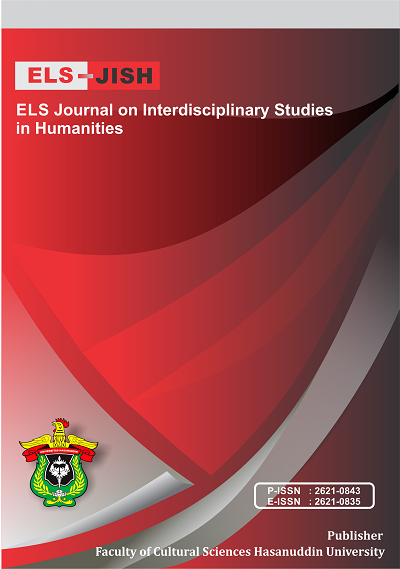Online Language Teaching: A Bibliometric Analysis
DOI:
https://doi.org/10.34050/elsjish.v7i1.32472Keywords:
Bibliometric Analysis, Online Language Teaching, Research GapsAbstract
For decades, researchers have been researching online education. Numerous scholarly works have concentrated on online teaching and learning theories, as well as quality online learning and online course design assessment criteria. This is a bibliometric analysis. Online Language Teaching is the keyword is considered for the analysis. Publications taken from the Scopus database from 2006 to 2022. Only the English language articles are selected. The final database comprises 74 articles in this area of research. The objectives of the study are: (1) To examine the trend of publications related to “Online Language Teaching”; (2) To examine the highly cited authors related to “Online Language Teaching”; (3) To examine the highly cited sources related to “Online Language Teaching”; (4) To examine the highly cited countries related to “Online Language Teaching”; (5) To examine the frequently used keywords related to “Online Language Teaching”; (6) To recommend future research opportunities related to “Online Language Teaching”.
References
Adnan, M. (2018). Professional development in the transition to online teaching: The voice of entrant online instructors. ReCALL, 30(1), 88-111.
Anggawirya, A. M., Prihandoko, L. A., & Rahman, F. (2021). Teacher’s Role on Teaching English during Pandemic in a Blended Classroom. In International Joined Conference on Social Science (ICSS 2021) (pp. 458-463). Atlantis Press.
Al-Obaydi LH, Shakki F, Tawafak RM, Pikhart M and Ugla RL (2023) What I know, what I want to know, what I learned: Activating EFL college students’ cognitive, behavioral, and emotional engagement through structured feedback in an online environment. Front. Psychol. 13,1083673. https://doi.org/10.3389/fpsyg.2022.1083673
Al-Obaydi, L. H., Rahul, D. R., & Pikhart, M. (2024). The effect of online oral reading on reading comprehension, reading anxiety, and classroom anxiety among EFL learners. Education and Information Technologies, 29(3), 2841-2855. https://doi.org/10.1007/s10639-023-11950-y
Al-Obaydi, L. H., & Iddagoda, A. (2022). Dyslexic Students' Motivation, Habits and Attitudes towards Digital-based Reading: A Case Study of EFL College Students. Journal of Asia TEFL, 19(1), 327.
Borg, S. (2015). Teacher Cognition and Language Education: Research and Practice. Bloomsbury Publishing.
Compton, L. K. (2009). Preparing language teachers to teach language online: A look at skills, roles, and responsibilities. Computer assisted language learning, 22(1), 73-99.
Cenoz, J., & D. Gorter. (2022). Pedagogical Translanguaging (Elements in Language Teaching). University of Michigan (USA): Cambridge University Press. doi:10.1017/9781009029384
Gartziarena, M., Villabona, N., & Olave, B. (2023). In-service teachers’ multilingual language teaching and learning approaches: insights from the Basque Country. Language and Education, 1-15.
Gacs, A., Goertler, S., & Spasova, S. (2020). Planned online language education versus crisis‐prompted online language teaching: Lessons for the future. Foreign Language Annals, 53(2), 380-392.
González‐Lloret, M. (2020). Collaborative tasks for online language teaching. Foreign Language Annals, 53(2), 260-269.
Ho, W. Y. J., & Feng, D. (2022). Orchestrating multimodal resources in English language teaching: a critical study of an online English teaching video. Pedagogies: An International Journal, 17(4), 368-388.
MacIntyre, P. D., Gregersen, T., & Mercer, S. (2020). Language teachers’ coping strategies during the Covid-19 conversion to online teaching: Correlations with stress, wellbeing and negative emotions. System, 94, 102352.
Paradowski, M. B., & Jelińska, M. (2023). The predictors of L2 grit and their complex interactions in online foreign language learning: motivation, self-directed learning, autonomy, curiosity, and language mindsets. Computer Assisted Language Learning, 1-38.
Pikhart, M., & Al-Obaydi, L. H. (2023). Potential pitfalls of online foreign language teaching from the perspective of the university teachers. Heliyon, 9(2). https://doi.org/10.1016/j.heliyon.2023.e13732
Pikhart M, Klimova B, Al-Obaydi LH, Dziuba S and Cierniak-Emerych A (2022) The quantitative evaluation of subjective satisfaction with digital media in L2 acquisition in younger adults: A study from Europe, Asia, and Latin America. Front. Psychol. 13, 946187. https://doi.org/10.3389/fpsyg.2022.946187
Siebenhütter, S. (2023). How important is teacher training? Untrained community tutors and professional teachers motivation and success in online second language teaching (SLT) and implications for future online SLT. Cogent Education, 10(2), 2244836.
Stickler, U., & Shi, L. (2013). Supporting Chinese speaking skills online. System, 41(1), 50-69.
Sukmawaty, Rahman, F. F. & Andini, C. (2022). Covid-19 Pandemic and Axiology of Communication: A Study of Linguistic Phenomena. IJISRT, 7(4), 1079-1087.
Sun, S. Y. H. (2011). Online language teaching: The pedagogical challenges. Knowledge Management and E-Learning, 3(3), 428–447.
Sun, S. Y. (2014). Learner perspectives on fully online language learning. Distance education, 35(1), 18-42.
Tawafak RM, Al-Obaydi LH and Pikhart M (2023) Competency categorization and roles of online teachers from the perspective of university students. Front. Psychol. 14, 1009000. https://doi.org/10.3389/fpsyg.2023.1009000
van der Ploeg, M., & Blankinship, B. (2022). Online language learning in the third-age: Concrete recommendations to improve seniors’ learning experiences. Gerontology & Geriatrics Education, 8(1), 1-11.
Yang, Y. F. (2014). Preparing language teachers for blended teaching of summary writing. Computer Assisted Language Learning, 27(3), 185-206.
Yaumi, M. T. A. H., Rahman, F., & Sahib, H. (2023). Exploring WhatsApp as Teaching and Learning Activities during Covid-19/New Normal era: A Semiotic Technology Analysis. International Journal of Current Science Research and Review, 6(12), 7627-7634.
Zhen, L., Curran, N. M., & Galperin, H. (2023). Factors driving teacher selection on online language tutoring platforms: an experiment-based approach. Journal of Multilingual and Multicultural Development, 1-14.
Downloads
Published
How to Cite
Issue
Section
License
Copyright (c) 2024 Lakshani Ranasinghe, Anuradha Iddagoda, Hiranya Dissanayake

This work is licensed under a Creative Commons Attribution-ShareAlike 4.0 International License.






